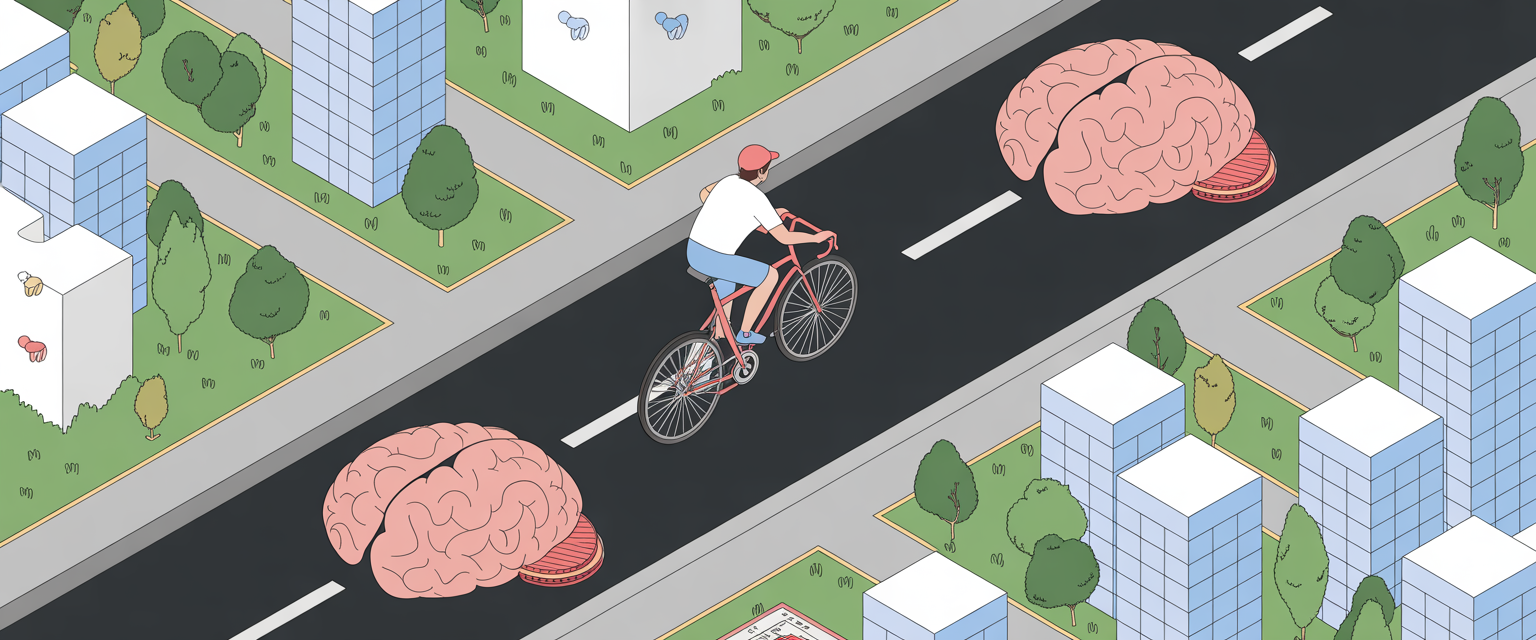Study: Cycling for transport cuts dementia risk by 19%

TL;DR
New research reveals that cycling as a form of transportation could reduce dementia risk by 19% and Alzheimer's risk by 22%. This protective effect appears linked to increased gray matter volume in critical memory regions of the brain, including the hippocampus. The cognitive benefits of active travel persist regardless of genetic predisposition, offering a practical, accessible strategy for supporting long-term brain health.
Why This Matters
With dementia rates rising globally, especially among older adults, finding practical prevention strategies is crucial. This study provides compelling evidence that something as simple as choosing a bicycle over a car for daily transportation can significantly impact brain health. Unlike complex medical interventions, active travel represents an accessible approach that simultaneously addresses physical fitness, environmental concerns, and cognitive protection. For health-conscious individuals looking to maintain mental sharpness throughout aging, this research offers a clear pathway to incorporate neuroprotective activity into everyday routines rather than treating exercise as a separate obligation.
Key Research Findings
- Long-term impact: Over the 13-year study period, 1.8% of participants received dementia diagnoses
- Cycling benefits: Regular cycling was associated with 19% lower overall dementia risk and 22% reduced Alzheimer's risk
- Brain structure changes: Researchers observed increases in gray matter volume in memory-associated brain regions, including the hippocampus
- Genetic factors: While genetic predisposition (APOE ε4 carriers) influenced results, active travel provided benefits regardless of genetics
- Consistent protection: The cognitive benefits of cycling persisted even after accounting for various demographic and health factors
The Science Behind Brain Protection
The study's findings align with established neurological research on exercise and brain health. Regular aerobic activity like cycling increases blood flow to the brain, delivering vital oxygen and nutrients while simultaneously removing metabolic waste. This improved circulation supports the production of brain-derived neurotrophic factor (BDNF), often called "fertilizer for the brain," which promotes the growth and maintenance of neurons.
What makes this research particularly valuable is the focus on active travel rather than structured exercise programs. By studying transportation cycling—an activity integrated into daily routines—researchers identified a sustainable approach to brain health that doesn't require dedicated workout time or special equipment.
The observed increase in hippocampal volume is especially significant because this brain region is critical for memory formation and is typically one of the first areas affected by Alzheimer's disease. Essentially, regular cycling appears to strengthen precisely the brain structures most vulnerable to age-related cognitive decline.
How Active Travel Protects Your Brain
Active travel's cognitive benefits likely stem from multiple mechanisms:
1. Enhanced cerebral blood flow: Cycling increases circulation to the brain, delivering oxygen and nutrients while removing waste products that can contribute to cognitive decline.
2. Reduced inflammation: Regular physical activity helps lower systemic inflammation, which is increasingly recognized as a contributor to neurodegenerative conditions.
3. Improved vascular health: Cycling strengthens the cardiovascular system, reducing risk factors like hypertension that can damage brain tissue over time.
4. Stress reduction: Active commuting can lower cortisol levels and provide mental space between work and home, potentially protecting against stress-related cognitive impairment.
5. Neurogenesis support: Regular aerobic activity promotes the creation of new neurons and neural connections, particularly in memory-related brain regions.
Beyond Genetics: Lifestyle Choices Matter
One of the most encouraging aspects of this research is that cycling provided cognitive protection regardless of genetic risk factors. While carriers of the APOE ε4 gene (which increases Alzheimer's risk) showed somewhat different patterns of benefit, active travel still offered significant cognitive protection across genetic profiles.
This finding reinforces the growing understanding that lifestyle factors can substantially influence cognitive outcomes even in the presence of genetic predisposition. Rather than viewing dementia risk as predetermined by genetics, this research suggests that daily movement choices create meaningful opportunities to protect brain function throughout aging.
Practical Applications
For those looking to incorporate the brain-protective benefits of active travel into their lives:
Start small: Begin with short cycling trips to nearby destinations before attempting longer commutes.
Prioritize safety: Invest in proper safety equipment and plan routes that utilize bike lanes or less-trafficked streets.
Make it convenient: Keep your bike easily accessible and properly maintained to remove barriers to regular use.
Track your progress: Use a fitness tracker or app to monitor your active travel and celebrate consistency rather than distance or speed.
Combine strategies: Pair cycling with other brain-healthy habits like Mediterranean-style eating patterns, cognitive challenges, and quality sleep for synergistic benefits.
Consider e-bikes: For those with physical limitations or challenging terrain, electric-assist bicycles provide many of the same benefits while making cycling more accessible.
Limitations and Considerations
While promising, this research does have limitations. The study design cannot definitively prove causation—it's possible that people with better brain health are simply more likely to cycle. Additionally, the research doesn't establish a minimum "dose" of cycling needed for cognitive benefits.
It's also important to note that active travel represents just one component of a brain-healthy lifestyle. Nutrition, sleep quality, stress management, and cognitive engagement all play crucial roles in maintaining cognitive function throughout aging.
The Bottom Line
The simple act of cycling for transportation offers significant protection against dementia and Alzheimer's disease by increasing gray matter volume in critical memory regions. Unlike many health interventions, active travel seamlessly integrates physical activity into daily routines, making it sustainable over the long term. By choosing active transportation when possible, you're not just saving gas money—you're making a powerful investment in your long-term cognitive health that works regardless of genetic predisposition.



